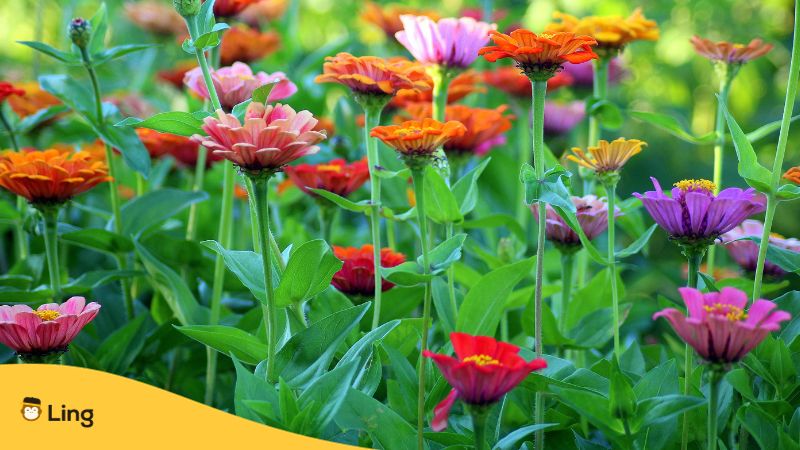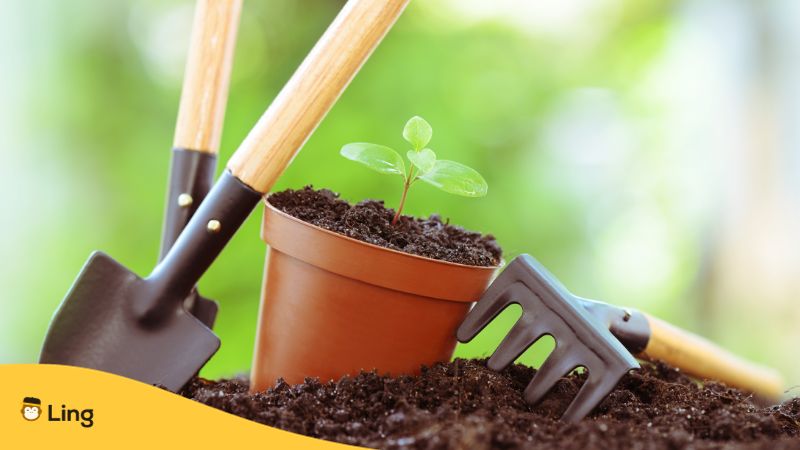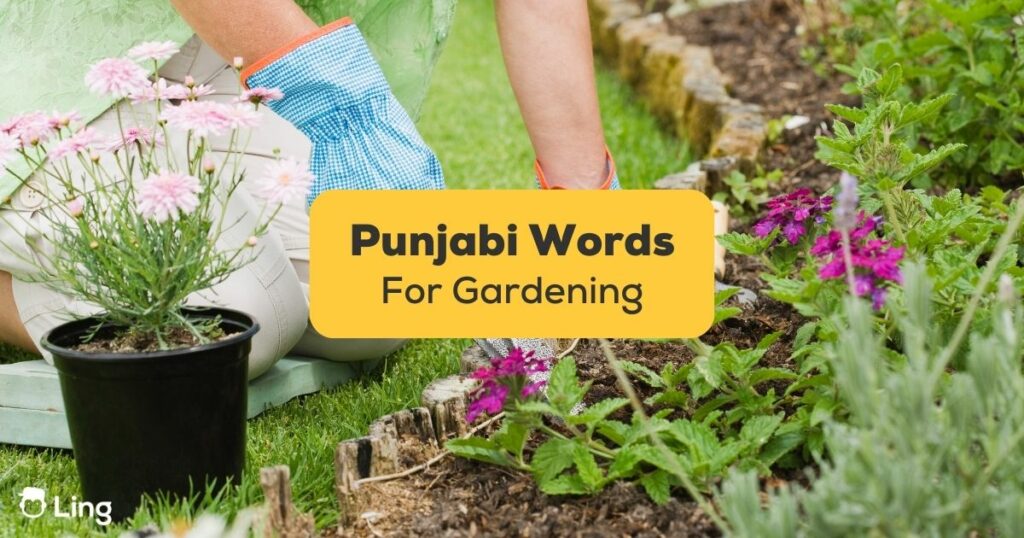Dive deep into the verdant landscapes of Punjab, and you’ll realize that every flower, every tree, and even the very soil speaks a language of its own. The reason? Well, the Punjabi words for gardening are more than just terminologies; they encapsulate stories, traditions, and the very essence of the Punjabi spirit. Let’s get to know more about this in today’s comprehensive guide!
What Is “Gardening” In Punjabi?
In Punjabi, the term for “gardening” is “ਬਾਗਵਾਨੀ” (Bāgvānī). At its core, this word encapsulates the act of tending to a garden. Directly, it translates to “gardening” or “horticulture.” However, in the broader Punjabi cultural context, Bāgvānī is more than just a hobby or a pastime. It’s an age-old tradition, a symbol of the Punjabi people’s love for the land and nature, and a testament to their innate need to nurture and cultivate.
Want to take your sentence to new levels? Here are some synonyms you may consider:
- ਬਾਗ (Bāg): This term means “garden” in Punjabi. A ‘Bāg’ is often a cherished space in many Punjabi homes, where families grow a variety of fruits, vegetables, and vibrant flowers. The word evokes images of intimate spaces filled with fragrant blooms, buzzing bees, and the laughter of children playing.
- ਖੇਤੀ (Khētī): Translating to “farming” or “agriculture,” Khētī is much more than just commercial crop production in Punjab. Especially in rural Punjab, tending to one’s fields has the same personal touch as tending to a garden in one’s backyard. It’s where generations have toiled, hoped, and reaped.

Why Learn Punjabi Words For Gardening?
Embarking on the journey to learn “Punjabi Words For Gardening” is akin to sowing seeds in a fertile field. Not only does it bear linguistic fruits, but it also offers an enriching exploration into the culture, history, and heart of Punjab. Here’s why delving into this niche vocabulary is a venture worth pursuing:
- One gets a first-hand experience of the Punjabi way of life since each term is a window into the community’s values, traditions, and passions.
- One can also tap into the reservoir of traditional knowledge, possibly discovering new methods or understanding different perspectives on plant care.
- Understanding the Punjabi terminology can provide a new dimension to their hobby.
So basically, learning Punjabi words for gardening is more than just an expansion of vocabulary. It’s an adventure into a world where language meets land, where words echo the rhythm of nature, and where every term is steeped in history, emotion, and cultural significance. Whether you’re a linguist, a gardener, or simply curious, this journey promises to be enlightening and enriching.
Essential Punjabi Vocabulary For Gardening
Let’s now unearth common Punjabi words and phrases related to gardening. It’s time to learn one Punjabi word at a time without getting help from a Punjabi dictionary:
Names Of Common Plants And Vegetables
Here are some common examples of garden-related Punjabi words that are actually names of plants and vegetables:
| English Name | Punjabi Translation | Punjabi Script |
|---|---|---|
| Cauliflower | Gobhi | ਗੋਭੀ |
| Potato | Aloo | ਆਲੂ |
| Spinach | Palak | ਪਾਲਕ |
| Carrot | Gajar | ਗਾਜਰ |
| Fenugreek | Methi | ਮੇਥੀ |
| Eggplant | Baingan | ਬੈਂਗਣ |
| Flower | Phool | ਫੂਲ |
| Bael fruit | Bel | ਬੇਲ |
| Tomato | Tamatar | ਟਮਾਟਰ |
| Rose | Gulab | ਗੁਲਾਬ |
| Indian round gourd | Tinda | ਤਿੰਦਾ |
| Mint | Pudina | ਪੁਦੀਨਾ |
Gardening Tools And Equipment
Here are examples of Punjabi words for the tools you use in the garden to dig the ground and take care of your vegetable or flower plants:
| English Term | Punjabi Translation | Punjabi Script |
|---|---|---|
| Hoe | Kudali | ਕੁੱਦਾਲੀ |
| Spade | Belcha | ਬੇਲਚਾ |
| Wheelbarrow | Phawda | ਫਵੜਾ |
| Pruning shears | Kudnay | ਕੁੜਨੇ |
| Rake | Dantli | ਦਾੰਤਲੀ |
| Shovel | Kurpa | ਕੁੜਪਾ |
| Hammer | Hathora | ਹਥੌੜਾ |
| Soil | Matti | ਮਟੀ |
| Pitchfork | Chhant | ਛੰਤ |
| Watering can | Kasa | ਕਾਸਾ |

Weather And Climate-Related Terms
Understanding the weather and climate is fundamental for any gardener, and it’s no different when you’re into the Punjabi gardening culture:
| English Term | Punjabi Translation | Punjabi Script |
|---|---|---|
| Weather | Mausam | ਮੌਸਮ |
| Rain | Barish | ਬਰਿਸ਼ |
| Storm | Toofan | ਤੂਫ਼ਾਨ |
| Sunlight | Dhoop | ਧੂਪ |
| Clouds | Badal | ਬਦਲ |
| Cold | Thand | ਠੰਡ |
| Heat | Garmi | ਗਰਮੀ |
| Winter | Sardi | ਸਰਦੀ |
| Monsoon | Varsha | ਵਰਸ਼ਾ |
| Wind | Hawa | ਹਵਾ |
| Snow | Baraf | ਬਰਫ |
Seasonal Gardening And Punjabi Festivals
Gardening is also a celebration of nature’s rhythms and cycles. In Punjab, these cycles are connected with festivals that celebrate the agricultural heritage of the region.
Vaisakhi
Vaisakhi, celebrated on April 13th or 14th every year, is one of the most important festivals in Punjab. It marks the Punjabi New Year and is closely tied to the harvesting of the Rabi crop, which includes wheat, barley, and other cereals. The English translation of this festival is the celebration of a bountiful harvest.
During this time, farmers gather in their fields to collect their harvests, and the atmosphere is filled with joy, gratitude, and a sense of accomplishment. Vaisakhi also marks the anniversary of the Khalsa, the Sikh brotherhood, and is observed with grand processions and prayers at gurdwaras (Sikh temples).
Lohri
Lohri, celebrated on January 13th each year, is a winter festival and a time to bid farewell to the biting cold and welcome the longer days of spring. It is associated with the harvesting of sugarcane crops and the end of the winter harvest season. During the event, people gather around bonfires, sing traditional songs, and dance to the beats of the dhol (drum).
Learn More Punjabi Gardening Words With Ling
Elevate your gardening experience with Ling, the language-learning app that brings a touch of Punjabi charm to your green haven! It enhances your appreciation of unfamiliar words and languages by learning in an engaging and fun way. So our advice? Download Ling from the Play Store or App Store now, and immerse yourself in a world of interactive activities and games that make learning Punjabi educational and enjoyable.


































































